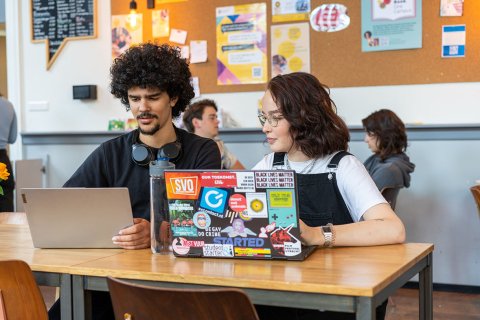Study programme
From September onwards, the year is divided into two semesters, running from September until January and from February until June. A semester is divided into two study periods.
Curriculum
The programme consists of compulsory courses, electives, an internship and a Master's thesis. Check the study schedule (PDF). The exact schedule of the courses (on which days they are taught) will be made available a few weeks prior to the start of the course.
First semester
- Compulsory courses (20 EC) to familiarise you with the theoretical and methodological frameworks of Gender Studies.
- Elective courses (10 EC), in which you will focus on themes and topics such as art and affect, postcoloniality, or new technologies.
Second semester
- An academic thesis (15 EC) on a subject of your choice. The thesis will deepen your understanding and explore a particular aspect you encountered during your internship in a sophisticated academic manner.
- A full-time internship (15 EC) at an (inter)national organisation, institution, or company of your choice.
Your programme starts with the NOISE Summer School, an interactive week of lectures, work groups, and social activities. The NOISE Summer School always takes place in the last week of August (i.e. the week before the academic year starts and a small contribution to the NOISE programme will have to be paid).
Part-time
If you take this Master’s programme part-time, you will follow the same courses as outlined in the study programme above, but you will follow two courses per block instead of three. You will also do the internship over two blocks part-time (instead of one block full-time), and write the thesis over two blocks (instead of one block full-time).

Educational methods
- lecture (10%)
- seminar (20%)
- group work (20%)
- internship (25%)
- self-study (25%)
Internship
The aim of this programme is to integrate theory with practice. Your internship will provide you with an enriching opportunity to become acquainted with work in the field and to gain professional experience. Gender Studies distinguishes itself by putting great emphasis and care on students' internships. Students find the opportunity to do their internship in a variety of international organisations, institutions, and research locations, from a large network that Gender Studies in Utrecht has established. Most popular choices are:
Atria | Kosmopolis | FNV Vrouw | Mama Cash | WOMEN Inc. | Stedelijk Museum | ATGENDER | United Nations | Castrum Peregrini
Examinations
- written assignments
- presentations
- creative assignments *
- internship
- thesis
* E.g. the course Feminist Approaches to Art and Affect will give you the possibility for a final performance, in which you are free to choose the format of your presentation. It can be a poster, a short movie, photographs, a song, a poem, etc.
Extra opportunities
For students looking for an extra challenge in addition to their Master's, there are several options. Utrecht University offers several honours programmes for students looking for an extra challenge. Honours education is followed on top of your regular Master's programme and goes beyond the regular curriculum. Honours programmes are available at interdisciplinary level and allow you to work on projects that transcend your own discipline.

